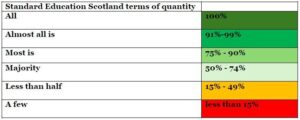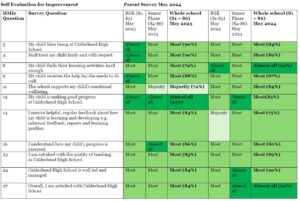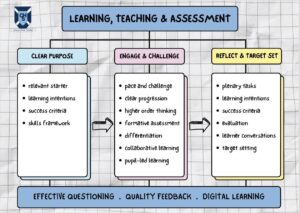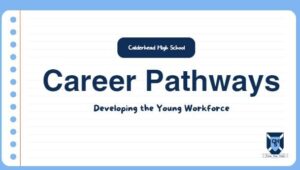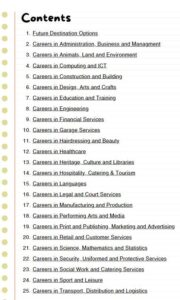As the start of the SQA exam diet looms it brings with it a whirlwind of emotions and stress for pupils, teachers, and parent/carers. Not only is your child revising hard for the final exams, but they may also have to meet deadlines for assessments and/or assignments.
School staff have, of course, a crucial role to play in helping your child to prepare for this challenge. However, as parents/carers you are in an unique position to offer substantial support to your child’s mental good health and academic achievement at home.
As parents/carers it’s sometimes hard to know how best to support your child in a sustainable way when they are stressed. To help you we’ve put together practical, proven strategies that you as parents/carers can use to help your child during this important time and throughout their school/academic career.
PROMOTE HEALTHY SLEEP HABITS
Sleep is vital for memory consolidation, a process which is integral to learning. You can help support your child by ensuring they follow a regular sleep schedule, getting the recommended 8-10 hours of sleep each night. This becomes even more crucial during the exam season, when quality sleep can enhance concentration and memory. Studies indicate that sleep helps form new neural connections and prioritise important information, enabling better recall during exams. In fact, prioritising sleep during exams has been shown to lead to higher grades.
ENCOURAGE A NUTRITIOUS BREAKFAST
Despite the common knowledge that breakfast is the most important meal of the day, studies show that a significant percentage of teenagers regularly skip breakfast, with over 60% of teenage boys and 70% of teenage girls doing so.
Parents/Carers can play a crucial role in reversing this trend, emphasising the importance of a nutritious morning meal. Research indicates that children who skip breakfast or rely on energy drinks perform worse in attention and memory tasks compared to their breakfast-eating counterparts.
MINIMISE DISTRACTIONS
In an age of digital distractions, parents/carers can aid their child’s revision by creating a calm, distraction-free environment. This may look like looking after their child’s phone for them during study sessions, turning the TV off, or helping them ensure their desk is tidy.
Multiple studies have debunked the myth of efficient multitasking, showing that the mere presence of a phone can cause a 20% decline in performance – even if students don’t use it. Encouraging students to put away their phones during revision can reduce errors and improve productivity.
IMPLEMENT RETRIEVAL PRACTICE
Retrieval Practice, a strategy that involves recalling previously learned knowledge by generating an answer to a question, is one of the most effective revision techniques. It helps strengthen memory traces and increases the likelihood of long-term information retention and can take many forms, from past papers to quizzes.
One great way to utilise Retrieval Practice at home is by using flashcards. For example, parents and guardians can encourage their child to use the Leitner System, a handy way to make the best of flashcards.
GETTING THEIR CHILD TO TEACH THEM THE MATERIAL
A powerful way to reinforce understanding is for students to teach the material to someone else. Known as the Protégé Effect, this technique improves memory recall and enhances understanding. When students prepare to explain the material to others, they organise and clarify their thoughts, leading to a deeper comprehension of the subject matter.
So, parents and guardians could utilise the Protégé Effect by getting their child to teach them about some of the key concepts they need to master.
COMBAT PROCRASTINATION
Motivating a child to revise can be tricky. However, research shows that highlighting the practical applications of the revising content can increase motivation. Parents can share examples of how they’ve used the knowledge they learned at school later in life, thus making learning more relatable and engaging.
BALANCE WORK AND PLAY
While studying is important, it’s equally crucial to set aside time for relaxation and leisure. High stress levels can negatively impact a child’s well-being and even the quality of their revision.
Incorporating a healthy balance of screen time, socialising, partaking in hobbies and exercising within study can contribute to exam success by providing necessary mental breaks. This will help students stay motivated and avoid burnout but will also give their brain the time to consolidate their learning.
SHOW INTEREST – AND GIVE PRAISE
“As they complete a task, ask them to show it to you. Their endorphins will flow if you acknowledge their effort with praise, and if they can see you mean it. They are also likely to be intrigued and motivated if you show genuine interest in the topic being revised, and if you admit to having limited knowledge yourself which is being enhanced by their own studies.” Matthew Godfrey
FAMILIARISE YOURSELF WITH PAST PAPERS
It can be helpful for parents/carers to familiarise yourselves with SQA past papers as it is essential that your child practises questions from past papers specific to the subject and stage. Going through past papers with your child, in a conducive environment, making sure that mobile phones and social media are not distracting them is an excellent study technique. If you make notes of which questions your child got wrong or didn’t know the answer to your child can address this with their teacher either in class or during supported study. You can then test them again with that question after more revision to see if they now understand.
FINAL THOUGHTS
As parents/carers you play a pivotal role in shaping the academic successes of your child – not only by teaching and supporting them every day, but also by giving them access to great habits. Introducing them to the strategies we’ve mentioned is a powerful way to boost not just grades, but also overall student growth and development.
Whether it’s making sure your child kicks off their day with a hearty breakfast or championing good sleep habits, you have the potential to leave a lasting impact on your child’s educational journey and their future habits.
Good luck in the coming weeks and months and remember if you have any concerns or worries do not hesitate to contact school. We are here to help support not only your child but also you, our Parents and Carers.
Parent and Carer guide SQA Jan 2024

